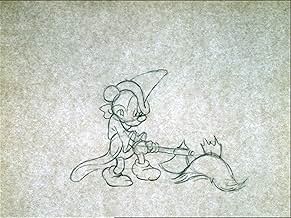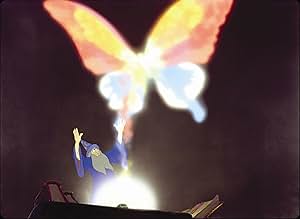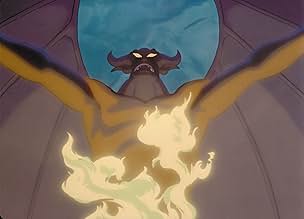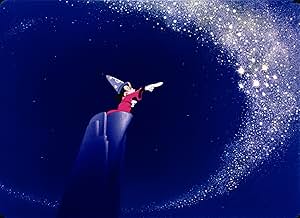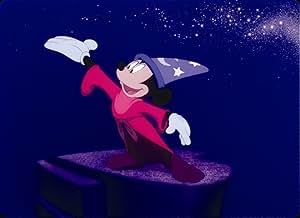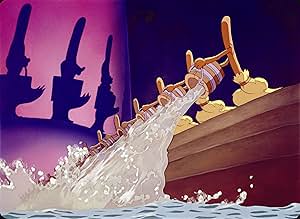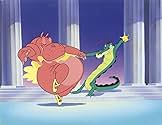CALIFICACIÓN DE IMDb
7.7/10
108 k
TU CALIFICACIÓN
Una colección de interpretaciones animadas de grandes obras de música clásica occidental.Una colección de interpretaciones animadas de grandes obras de música clásica occidental.Una colección de interpretaciones animadas de grandes obras de música clásica occidental.
- Premios
- 9 premios ganados y 1 nominación en total
Corey Burton
- Narrator: Deems Taylor overdubs (2000 restoration)
- (voz)
- (sin créditos)
Walt Disney
- Mickey Mouse (segment 'The Sorcerer's Apprentice')
- (voz)
- (sin créditos)
Hugh Douglas
- Narrator (1982 version)
- (voz)
- (sin créditos)
James MacDonald
- Percussionist
- (sin créditos)
Tim Matheson
- Narrator (1985 version)
- (voz)
- (sin créditos)
Julietta Novis
- Soloist (segment 'Ave Maria')
- (doblaje en canto)
- (sin créditos)
Paul J. Smith
- Violinist
- (sin créditos)
Opiniones destacadas
Disney's "Fantasia" is a pure classic.
What we are shown are a few animated musicals, filled with grand splendor and vivid colors.
"Fantasia" is one of those films that everyone knows by heart, and has watched since being a child.
My personal favorite was always the Mickey Mouse short - one of the darkest Mickey cartoons I've ever seen.
If you haven't seen "Fantasia" yet, then you must be from another planet. It is one of the best Disney musicals ever, which some push aside and forget too easily.
5/5 stars-
John Ulmer
What we are shown are a few animated musicals, filled with grand splendor and vivid colors.
"Fantasia" is one of those films that everyone knows by heart, and has watched since being a child.
My personal favorite was always the Mickey Mouse short - one of the darkest Mickey cartoons I've ever seen.
If you haven't seen "Fantasia" yet, then you must be from another planet. It is one of the best Disney musicals ever, which some push aside and forget too easily.
5/5 stars-
John Ulmer
This is one of the truly rare, one of a kind movie going experiences, kind of in the same league as watching 2001: A Space Odyssey. I like to watch this film repeatedly; often times I'll just close my eyes and daydream, letting my own imagination go in place of whats on the screen. My favorite part is the opening sequence, with its dramatic music and free flowing imagery foreshadowing the state of the world in 1940. The end of Ave Maria is the perfect bookend to this masterpiece; death has withdrawn and peace has finally arrived. It would, but not for another five years and millions of lives. I can never watch this movie without seeing it in this context; for me its a work of art, both a part and ahead of its time.
This unusual and very creative classic of animation combines a very interesting idea with quite a bit of imagination, plus visual effects that still hold up quite well. All but a couple of the sequences are quite enjoyable, and some especially so. Even the segments that don't work as well are usually at least interesting, since you can at least appreciate what they were trying to accomplish.
You don't really have to be all that familiar with the specific pieces of music for it to be worthwhile, since in several cases they chose to match the music with material that is rather different in nature from any original context that it may have had. And in any case, the animated sequences are intended to provide the context, in terms of the movie.
No doubt, everyone will have his or her own favorite segments, based on the music itself and on the choice of accompanying visual material. The "Sorcerer's Apprentice" sequence, with Mickey Mouse, is certainly one of the most memorable. The adaptation of "The Rite of Spring" is quite imaginative in using an entirely different setting for the music. "Night on Bald Mountain" has striking and sometimes bizarre visuals.
Many of the classic Disney features still hold up well as family entertainment, but "Fantasia" is unique for its combination of imaginative concept and visual creativity. Not every minute of it works, but that's the price of being willing to experiment. It's an enjoyable and satisfying feature that well deserves to be remembered.
You don't really have to be all that familiar with the specific pieces of music for it to be worthwhile, since in several cases they chose to match the music with material that is rather different in nature from any original context that it may have had. And in any case, the animated sequences are intended to provide the context, in terms of the movie.
No doubt, everyone will have his or her own favorite segments, based on the music itself and on the choice of accompanying visual material. The "Sorcerer's Apprentice" sequence, with Mickey Mouse, is certainly one of the most memorable. The adaptation of "The Rite of Spring" is quite imaginative in using an entirely different setting for the music. "Night on Bald Mountain" has striking and sometimes bizarre visuals.
Many of the classic Disney features still hold up well as family entertainment, but "Fantasia" is unique for its combination of imaginative concept and visual creativity. Not every minute of it works, but that's the price of being willing to experiment. It's an enjoyable and satisfying feature that well deserves to be remembered.
In 1940, Walt Disney released "Fantasia", the third feature of his studio and maybe his most ambitious project, with a beautiful combination of classical music conducted by Leopold Stokowski and animation. The result is a movie that has been worshiped by every generation.
Yesterday I saw "Fantasia" again, now on the Special 60th Anniversary Edition DVD, restored and remastered with audio in THX inclusive with intermission. The program, for those that have eventually never seen or want to recall, is composed by the following:
(1) Toccata and Fugue in D Minor by Johann Sebastian Bach.
(2) Nutcracker Suite by Pyotr Ilyich Tchaikovsky.
(3) The Sorcerer's Apprentice by Paul Dukas.
(4) Rite of Spring by Igor Stravinsky.
(5) Intermission/Meet the Soundtrack.
(6) The Pastoral Symphony by Ludwig van Beethoven.
(7) Dance of the Hours by Amilcare Ponchielli.
(8) Night on Bald Mountain by Modest Mussorgsky.
(9) Ave Maria by Franz Schubert.
My vote is eight.
Title (Brazil): "Fantasia"
Yesterday I saw "Fantasia" again, now on the Special 60th Anniversary Edition DVD, restored and remastered with audio in THX inclusive with intermission. The program, for those that have eventually never seen or want to recall, is composed by the following:
(1) Toccata and Fugue in D Minor by Johann Sebastian Bach.
(2) Nutcracker Suite by Pyotr Ilyich Tchaikovsky.
(3) The Sorcerer's Apprentice by Paul Dukas.
(4) Rite of Spring by Igor Stravinsky.
(5) Intermission/Meet the Soundtrack.
(6) The Pastoral Symphony by Ludwig van Beethoven.
(7) Dance of the Hours by Amilcare Ponchielli.
(8) Night on Bald Mountain by Modest Mussorgsky.
(9) Ave Maria by Franz Schubert.
My vote is eight.
Title (Brazil): "Fantasia"
This without a doubt the greatest animated film in history. While highly acclaimed and well-known today, it was not terribly popular when it was first released. The idea of "Fantasia" is to take great pieces of music and draw animated sequences that match them. In doing so, it reverses the purpose of a movie's score; the movie serves and matches the music, not the other way around. This set up also means that there is no typical formula plot that is present in the vast majority of movies. In the first piece, the animation is vague and abstract, but in later ones it is of definite actions, objects, and stories. The two most famous(and my favorite) parts are probably "The Sorcerer's Apprentice" and "Rite of Spring". "Fantasia" is not only the best animated film ever made, but one of the greatest films period.
¿Sabías que…?
- TriviaDuring production, the animators were given no instructions for coloring. Walt Disney instructed them to use any colors they wanted, which was a first.
- ErroresWhen introducing the "Pastoral" sequence, Deems Taylor mixes Greek and Roman names of deities: Bacchus, Vulcan and Diana are Roman; Zeus, Iris and Morpheus are Greek. Apollo is the only one whose Greek and Roman equivalents have the same name.
- Citas
Mickey Mouse: [Pulling on Stokowski's coat] Mr. Stokowski! Mr. Stokowski!
[Mickey whistles to get Stokowski's attention]
Mickey Mouse: My congratulations, sir!
Leopold Stokowski: [shaking hands with Mickey] Congratulations to you, Mickey!
Mickey Mouse: Gee, thanks! Hehe! Well, so long! I'll be seeing ya!
Leopold Stokowski: Goodbye!
- Créditos curiososThere are no closing credits of any kind. Not even the words "THE END" appear on the screen.
- Versiones alternativasBefore the 1990 re-release, the film was shown with no credits other than the title and the RKO logo. Leopold Stokowski received a written credit only on the posters advertising the film. In the film's original roadshow release, not even the title was shown at the beginning of the film - that was saved for the intermission break.
- ConexionesEdited into A World Is Born (1955)
- Bandas sonorasToccata and Fugue in D Minor, BWV 565
Composed by Johann Sebastian Bach
Orchestrated by Leopold Stokowski (uncredited)
Played by The Philadelphia Orchestra
Conducted by Leopold Stokowski
Selecciones populares
Inicia sesión para calificar y agrega a la lista de videos para obtener recomendaciones personalizadas
Detalles
Taquilla
- Presupuesto
- USD 2,280,000 (estimado)
- Total en EE. UU. y Canadá
- USD 76,408,097
- Fin de semana de estreno en EE. UU. y Canadá
- USD 980,798
- 10 feb 1985
- Total a nivel mundial
- USD 76,412,966
- Tiempo de ejecución2 horas 4 minutos
- Color
- Mezcla de sonido
- Relación de aspecto
- 1.37 : 1
Contribuir a esta página
Sugiere una edición o agrega el contenido que falta

Principales brechas de datos
By what name was Fantasía (1940) officially released in India in Hindi?
Responda




